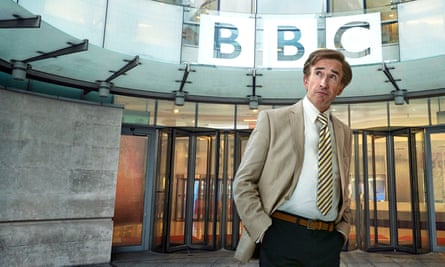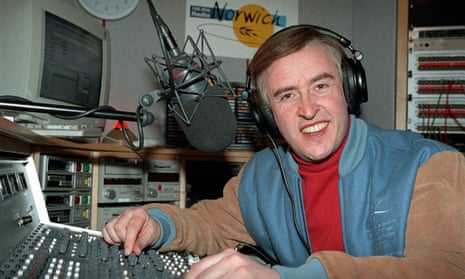It is fair to say that the TV presenter and North Norfolk Digital radio DJ, Alan Partridge, and his former employer, the BBC, did not part on the best terms. He once wrote that he hoped for a world without “famine and war and the BBC”. So it has come as a surprise to many TV industry watchers that the character, played by Steve Coogan, has been given a second chance with the broadcaster, some 27 years after his BBC debut. Partridge’s new show, This Time with Alan Partridge, a current affairs series, began filming this month. It will be a heady mix of consumer affairs, highbrow interviews and lightweight froth, the BBC says.
It’s the latest step in Partridge’s evolution from chatshow host to heavyweight broadcaster. His most recent documentary, Scissored Isle, for Sky in 2016, looked at the divide between the “haves and the have-nots, or haven’ts”. Coogan, who created Partridge along with director Armando Ianucci and writer Patrick Marber in Radio 4’s On The Hour in 1991, has said the new series will cover Britain in the age of Brexit, something Partridge almost certainly voted for.
“I think if he had a pint with Nigel Farage they’d get on like a house on fire,” Coogan said this week. Partridge has weighed in on Brexit before. Last year, in a debate for the Big Issue magazine, he said: “You hear a lot of grumbling from ReMOANers [whether teenagers, the Guardian or whoever] but when push comes to shove, the Leavers were in the majority.”
It is an unusual move by the BBC to rehabilitate a character with a past record of sexism, homophobia and manslaughter, and who remains something of a broadcasting liability. Scissored Isle was his “journey of redemption” after calling a teenager a “chav” on his North Norfolk Digital radio show.
“A lot of water has passed under the bridge,” says Shane Allen, the BBC’s controller of comedy commissioning. “It feels like Alan’s time has come again as the BBC seeks a seasoned presenter of his calibre and outlook as the country embarks on a time of introspection about our identity and place in the world. He’s also on less than a quarter of what he was paid back in the 90s.”
Partridge is “a broadcasting legend”, Allen says. “The public love him and yet he’s had the integrity to turn down every reality show going and stay true to his inner sense of misplaced superiority. I believe he will one day feature on a Royal Mail stamp collection of the TV presenting greats ... second-class small letter probably.” Partridge has loomed large in popular culture in recent years, if not on the mainstream airwaves. The presenter’s famed gaffes and false modesty gave rise to the concept of Partridgisms, now used to describe similar moments in politicians and celebrities. Broadsheet opinion pieces have noted how relevant Partridge is becoming in an age of amateurs versus experts and a backlash against the liberal metropolitan elite. Partridge is resolutely regional and has said Eamonn Holmes and Bill Oddie are his only showbusiness friends.

Partridge grew up in Norwich, in a house since demolished and replaced with Carphone Warehouse’s regional headquarters. An only child, the broadcaster wrote about his childhood loneliness in his 2011 autobiography I, Partridge: We Need To Talk About Alan. He went to East Anglia polytechnic and found work as a hospital radio DJ in Norwich. From there, he became the instore DJ for a branch of the music shop Our Price, before becoming a sports reporter on Saxon Radio in Bury St Edmunds. “I ascended the career ladder like a shaven Jesus ascending to his rightful place in the kingdom of heaven,” Partridge wrote. “I was poached by Radio Brodland [Great Yarmouth], Hereward Radio [Peterborough], Radio Orwell [Ipswich] and eventually Radio Norwich.”
According to his memoir, it was during the British archery championships, held in Norwich, that Partridge reached a national audience after one of the competitors shot a steward and Partridge broadcasted the developing news story. It brought him to the attention of radio commissioners and he was encouraged to apply for a job as sports reporter on BBC Radio 4’s new current affairs show, On the Hour. When that moved to television in 1994 and was renamed The Day Today, Partridge went with it.
It proved a momentous year for the presenter. He was given a BBC2 chatshow, Knowing Me Knowing You which, like The Day Today, had originated on Radio 4. Although initially successful, it wasn’t commissioned for a second series, partly because of falling audience figures, which Partridge explained by the evenings getting lighter and “more people out rambling or sitting in beer gardens” as well as his accidental fatal shooting of one of his guests.
It seemed unlikely Partridge would again reach the heights of his early success. He returned to Radio Norwich to present the early morning show and cut his ties with the BBC. “The BBC is nothing if not risk averse and I was seen as a bit of a maverick,” he wrote. For several years, he made corporate videos and presented the military quiz show Skirmish for a satellite channel. The BBC broadcast I’m Alan Partridge in 2002,[1] following his life in a travel tavern after his marriage broke down. By 2010, he was a presenting a parody radio show, Mid Morning Matters, on North Norfolk Digital, which he also filmed and broadcast on YouTube.
Partridge has been scathing about the BBC. In his memoir, he criticised its “restrictive, choking, stifling, suffocating bureaucracy and creativity-aborting compliance culture”. “He sees the BBC as unfinished business,” says the writer Neil Gibbons who, along with his writing partner and brother Rob, and Coogan, is co-directing the new series. “He was just getting into his stride – own show, production company, in the market for a six-bedroom house – and then he lost it all and he’s never really got over it. So he’s slagged them off ever since. He has that junior school mentality where your girlfriend dumps you and you make out you never liked her anyway. It’s just him reframing his sacking so as not to lose status.”
What drives Partridge? “God knows what drives Alan,” says Gibbons. “I bet Alan doesn’t even know what drives Alan. On the one hand, he’s driven by resentment and a need to rub certain people’s noses in his success. On the other, he’s a little man who needs the validation of a big audience because he’s not comfortable in his own skin.”
Despite his years in the broadcasting wilderness, Partridge remains respected among many of his peers. “There’s almost nothing he can’t do,” says the presenter and broadcaster Richard Madeley, who is not surprised by Partridge’s primetime comeback. “He came out of the womb a presenter. He’s a presenter born, not made, and second to none.”
Partridge’s talent is “probably his gift for asking the unexpected,” Madeley says. “You never know, when you’re watching Alan interviewing somebody, quite what he’s going to say next. I think as far as his guests are concerned, they don’t know what to expect. I mean, he’s capable of homicide [legal note: he was never charged], which gives him a dangerous edge. In terms of the actual questions that he throws to people, they are almost always left of field.” Madeley says that of course he views Partridge as a rival, and says many other TV and radio presenters would say the same. “He’s out there, scoping for jobs that people like me want and yes, for us, he’s a problem.”
Potted profile
Born: 1955, King’s Lynn
Career: After a start in hospital and regional radio, Partridge became sports reporter on the BBC Radio 4 current affairs show On The Hour, which transferred to TV in 1994 as The Day Today. His chat show Knowing Me Knowing You also began on Radio 4 before running for one series and a Christmas special on BBC2. He has been a DJ for Radio Norwich and for North Norfolk Digital. A documentary, Scissored Isle, for Sky, aired in 2016 and his new BBC series starts in 2018. He has written two memoirs: I, Partridge and Nomad.
High point: Being named TV Quick magazine’s Man of the Moment in 1994, following the success of his chat show
Low point: A Toblerone addiction
They say: “On one level, Alan is very likable because he makes mistakes and vocalises a lot of the insecurities that people feel. He’s also a contemptuous Little Englander, the kind of person who I see as my life to rail against.” Steve Coogan
He says: “Why am I clutched to the nation’s breasts? It’s because I’m normal. I’m one of you. I do what you guys do. Get up on a Saturday, make a batch of granola, put some toast on before doing a dozen lunges in front of Saturday Kitchen.”
